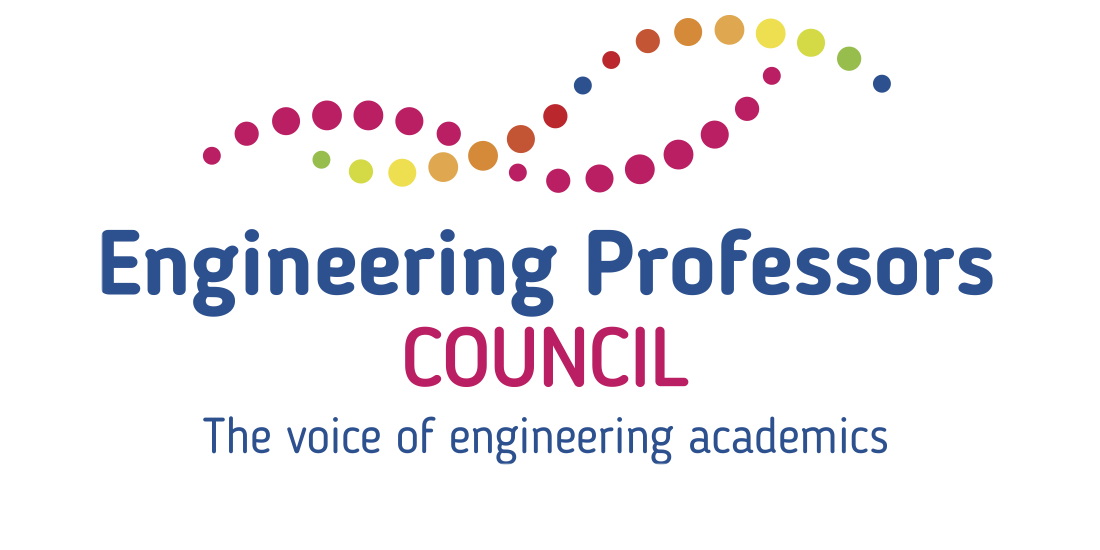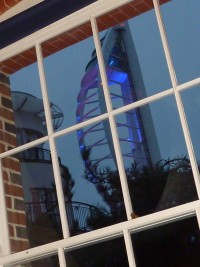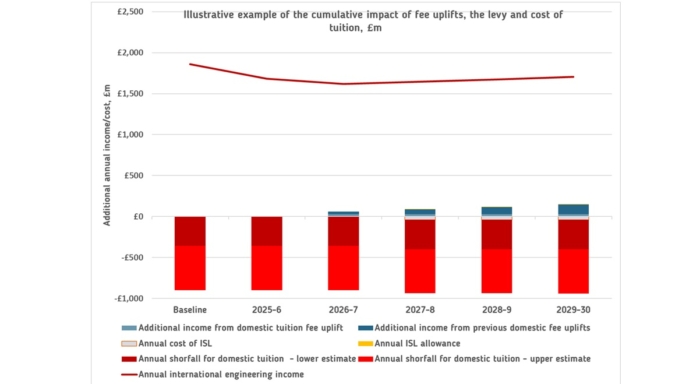The Engineering Professors’ Council Annual Congress 2013 took place at the University of Portsmouth on 16/17 April 2013 with the theme: Engineering in Higher Education: Investing for Impact.

Engineering Professors’ Council Annual Congress 2013
The Public Lecture “The importance of communicating science and engineering in the 21st century” was delivered by Professor Jim Al-Khalili, and this was followed by the Congress Dinner in the spectacular Spinnaker Tower in Portsmouth Harbour.
Andrew Miller MP, Chair of the Parliamentary and Scientific Committee delivered a speech to the pre-dinner reception on the importance of political engagement and Sir Michael Moore, former Commander of the Royal Yacht and Director General of the Institution of Mechanical Engineers delivered a highly entertaining after-dinner speech.
Please see the detailed schedule for this event, below.
Tuesday 16th April
Wednesday 17th April,
Professor Jim Al-Khalili OBE, who will deliver this year’s Congress Public Lecture, is a professor of physics, author and broadcaster based at the University of Surrey where he currently teaches and also holds a chair in the Public Engagement in Science. He received his PhD in nuclear physics in 1989 and remains active in research in theoretical physics. He is active as a science communicator and has written a number of popular science and history of science books, between them translated into over twenty languages. His latest is Paradox: The Nine Greatest Enigmas in Physics. He is a regular presenter of TV science documentaries, including the Bafta nominated Chemistry: A Volatile History and, most recently, Shock and Awe: The Story of Electricity and Order and Disorder, both for BBC4. He also presents the weekly BBC Radio 4 programme, The Life Scientific. He provides expert advice for bodies such as the Royal Society, the British Council and the Department for Education. He is also active in public life and is a strong advocate for rationalism and secularism and has recently taken over as president of the British Humanist Association. He is a recipient of the Royal Society Michael Faraday medal and the Institute of Physics Kelvin Medal.
Kate Bellingham was a BBC radio engineer working in the BBC Broadcasting House in 1988 when she was selected to co-host the annual Faraday Lecture sponsored by the Institution of Electrical Engineers – a tour of live shows for school pupils around the UK. A BBC Schools producer saw her perform and she was offered a presenting role on a new Design and Technology programme called Techno. She returned to her engineering training, but soon applied for Tomorrow’s World. Spotted as a talented communicator of science and a potential role model for young women in a traditionally male-dominated industry, she was offered the chance to join the team of presenters working on the BBC’s flagship popular science show in 1990 for four years.
Professor Helen Higson is Deputy Vice-Chancellor at Aston. She graduated from Newnham College Cambridge, and subsequently gained an MA from the Open University and a PhD from Birkbeck College, London University. In 2003 Helen founded the Centre for Higher Education Learning and Management (HELM). She has undertaken extensive research work in the areas of employability and work-based learning, intercultural learning and strategic issues in HE management. In 2008 Helen led the team which was awarded a Jaguar Land Rover Arts and Business Award with the MAP Consortium “for the partnership which best embeds culture as a core element of employee development”. She has edited (with Julie Green) nine editions of a Learning and Teaching Good Practice Guide.
Kirsten Bodley is the Chief Executive of STEMNET, a UK-wide organisation that works with thousands of businesses and schools to promote all aspects of Science, Technology, Engineering and Mathematics to young people. Kirsten has been with STEMNET for over 7 years, initially as Regional Director for London before becoming Director of Networks in August 2008. Previously, Kirsten had worked as a research scientist for many years, before moving on to management consultancy and subsequently becoming a qualified teacher. Kirsten has completed degrees in science, education and business, and is a member of the Society of Chemical Industry.
Keith Attwood is CEO of e2v, a Chelmsford based global technology company specialising in the manufacture and design of technology solutions, systems and components. The products e2v manufacture are used in a diverse range of high performance applications including not only space imaging and advanced medical therapy, but also energy saving industrial processing systems. Keith joined e2v as Managing Director in 1998 and has firmly positioned the company as an industry leader, delivering technological innovations that have won a variety of prestigious awards. In line with Keith’s deep commitment to corporate responsibility, he has led the initiative to move beyond environmental responsibility by electing to be measured against the full Corporate Responsibility index. Under Keith’s management e2v also has a strong record of engaging with all levels of academia, from schools to universities, including having been involved in collaborations with the University of Nottingham and The Open University. In addition to his duties as company executive, Keith has also served as Chair of the CBI East of England Regional Council, and he is currently Chair of the CBI Education and Skills Committee.
Beck Smith is the Assistant Director of the Campaign for Science and Engineering (CaSE) – the UK’s leading independent advocate for science and engineering in the UK – where she leads on CaSE’s policy analysis and development. CaSE has coordinated high-profile and successful campaigns against funding cuts to science and engineering, and for higher priority to be given to researchers in the immigration queue.
Before joining CaSE in October 2011, she was Head of Policy at the Biochemical Society. Most recently, Beck developed and now teaches a new course in science and policy for undergraduates at Imperial College London.
Beck holds a BSc Natural Sciences from the University and a MRes Government, Policy and Politics from Birkbeck, University of London.
You can follow Beck on Twitter – @beck_smith.
Graeme Reid is Head of Research Funding in the Department of Business Innovation and Skills. Graeme has oversight of around £5 billion per annum of research spending through Research Councils, the UK Space Agency, the UK Atomic Energy Authority and the Higher Education Funding Council for England. He coordinated the bid for the science budget in the Government’s 2010 spending review. Graeme started his career at the National Engineering Laboratory. He subsequently moved to Central Government where he held positions in the Treasury, the Cabinet Office, the DTI and DIUS before the formation of BIS in 2009. Graeme has a BSc in Physics and a PhD in Mechanical Engineering. He is a Chartered Engineer, a Fellow of the Institute of Physics and a Fellow of the Institution of Engineering and Technology. He is a member of the Council of CERN and an Associate Fellow of the Centre for Science and Policy at Cambridge University. He has served on Boards and advisory Committees in a range of organisations including the Scottish Funding Council, Cardiff University and the Institute of Physics.
Aaron Porter is a freelance journalist and higher education consultant, and was previously President of the National Union of Students. Previously, Aaron has served a non-executive board director for the Universities and Colleges Admission Service (UCAS), the Higher Education Academy (OIA) and the Office of the Independent Adjudicator (OIA). He was also the first President of NUS to be invited to serve as an observer to the Board of the Higher Education Funding Council for England (HEFCE). He was also been a member of the HFECE Online Learing Taskforce chaired by Dame Lynne Brindley and the Burgess Implementation Steering Group. He is currently working with the Council for Industry and Higher Education (CIHE) in establishing the National Centre for Universities and Business and on their Talent 2030 initiative.
Professor Cliff Hardcastle joined Teesside University in 2007 having previously been Assistant Principal for Knowledge Transfer and Commercial Development and Dean of the School of Built and Natural Environment at Glasgow Caledonian University. He had formerly been Head of School at the University of Westminster and Visiting Professor at the Royal Melbourne Institute of Technology University, Australia. Professor Hardcastle trained as a researcher with the then Building Performance Research Unit at Strathclyde University and holds a PhD from Heriot Watt University. His research interests include sustainability of the built environment and public private partnerships. He has always sought to bring research and practice closer together and in support of this, has won funding from several different agencies including the EPSRC, industry and government. He has also been an invited keynote speaker and external examiner to universities across the world.
He has held numerous industry, professional and academic committee roles and as Deputy Vice-Chancellor is responsible for leading the development and implementation of the University’s research and business engagement strategies. He also leads work on DigitalCity, a major economic regeneration project.
Andrew Miller studied at the London School of Economics where he was awarded a diploma in industrial relations in 1977. He worked initially as a laboratory technician at the Department of Geology at the then Portsmouth Polytechnic and then as an official of the MSF trade union. Elected to the Commons at the 1992 General Election, he is MP for Ellesmere Port and Neston. Having served on numerous select committees, in 2010 he was confirmed as the first Chair of the House of Commons Science and Technology Select Committee to be elected by all members of the House.
Renowned in engineering circles worldwide Paul joined Buro Happold in 1991 having graduated from Jesus College, Cambridge with a first class degree in engineering science. As a chartered engineer, Paul has contributed to some of Buro Happold’s most eye-catching and inspired building projects such as the London 2012 Olympic Stadium, the Millennium Dome, London, Dublin’s Aviva Stadium and the 2006 Winter Olympics Speed Skating Oval in Turin.
In March 2011 Paul was elected as Buro Happold’s Chief Executive Officer, heading up the practice’s 27 offices across the globe. His new role is also enabling him to be an ambassador for the engineering profession, raising its profile as a leader in providing solutions for many of the major life-changing issues that society is facing today and in the future. Indeed Paul still actively plays a creative role in delivering innovative, economic and socially responsible designs that address the key problems facing us such as climate change, resource scarcity and our ever expanding population and the continuous growth of the urban landscape.
Paul has firmly established his global reputation as a leading expert in the design and delivery of major sports and entertainment buildings on multi-award winning projects such as Arsenal’s new Emirates Stadium in London, Ascot’s world class racecourse and the innovative O2 Arena created within the Millennium Dome, London.
In 2000 Paul became the consultancy's youngest ever Principal when he was made a Partner and Director at 30. This followed his 1999 Royal Academy of Engineering MacRobert Award for Innovation for his work on the Millennium Dome - the first time a construction related project had won for three decades. In 2002, he established and led Buro Happold’s Design and Technology board, which promotes blue sky thinking and innovation, and is the focal point within the consultancy for ideas development and research. In 2008 he became Managing Director for our European business, overseeing all of the region’s offices and activities.
Paul is a Fellow of the Royal Academy of Engineering, the Institution of Civil Engineers, the Institution of Structural Engineers and the Royal Society for Arts, Manufacture & Commerce.
In 2008 he was awarded a Royal Academy of Engineering Silver Medal for his contribution to British engineering. He was named in The Times top 100 scientists list of 2010 and is a member of the judging panel for the newly launched Queen Elizabeth Prize for Engineering; a global award that seeks to recognise and reward the pivotal role that engineering plays in society today, something that Paul is passionate about. In May 2012 he was awarded the highly coveted Gold Medal from the Institution of Structural Engineers, which celebrates his many and varied achievements in the field of structural engineering.
In January 2013 Paul was recognised for his services to engineering and construction in the UK's New Years Honours list and awarded a CBE (Commander of the Order of the British Empire).
In March 2011 Paul was elected as Buro Happold’s Chief Executive Officer, heading up the practice’s 27 offices across the globe. His new role is also enabling him to be an ambassador for the engineering profession, raising its profile as a leader in providing solutions for many of the major life-changing issues that society is facing today and in the future. Indeed Paul still actively plays a creative role in delivering innovative, economic and socially responsible designs that address the key problems facing us such as climate change, resource scarcity and our ever expanding population and the continuous growth of the urban landscape.
Paul has firmly established his global reputation as a leading expert in the design and delivery of major sports and entertainment buildings on multi-award winning projects such as Arsenal’s new Emirates Stadium in London, Ascot’s world class racecourse and the innovative O2 Arena created within the Millennium Dome, London.
In 2000 Paul became the consultancy's youngest ever Principal when he was made a Partner and Director at 30. This followed his 1999 Royal Academy of Engineering MacRobert Award for Innovation for his work on the Millennium Dome - the first time a construction related project had won for three decades. In 2002, he established and led Buro Happold’s Design and Technology board, which promotes blue sky thinking and innovation, and is the focal point within the consultancy for ideas development and research. In 2008 he became Managing Director for our European business, overseeing all of the region’s offices and activities.
Paul is a Fellow of the Royal Academy of Engineering, the Institution of Civil Engineers, the Institution of Structural Engineers and the Royal Society for Arts, Manufacture & Commerce.
In 2008 he was awarded a Royal Academy of Engineering Silver Medal for his contribution to British engineering. He was named in The Times top 100 scientists list of 2010 and is a member of the judging panel for the newly launched Queen Elizabeth Prize for Engineering; a global award that seeks to recognise and reward the pivotal role that engineering plays in society today, something that Paul is passionate about. In May 2012 he was awarded the highly coveted Gold Medal from the Institution of Structural Engineers, which celebrates his many and varied achievements in the field of structural engineering.
In January 2013 Paul was recognised for his services to engineering and construction in the UK's New Years Honours list and awarded a CBE (Commander of the Order of the British Empire).
University of Warwick
Engineering and Physical Sciences Research Council (EPSRC)
Higher Education Funding Council for England (HEFCE)
University College London
Research in Focus Ltd
New World Value Creation Catalysts
Imperial College
University College London
Business-University Partnerships
Engineers Without Borders
University of Portsmouth
Institution of Mechanical Engineers (IMechE)
This content is for registered users only. Please login.
Subscribe
Login
Please login to comment
0 Comments
Oldest




